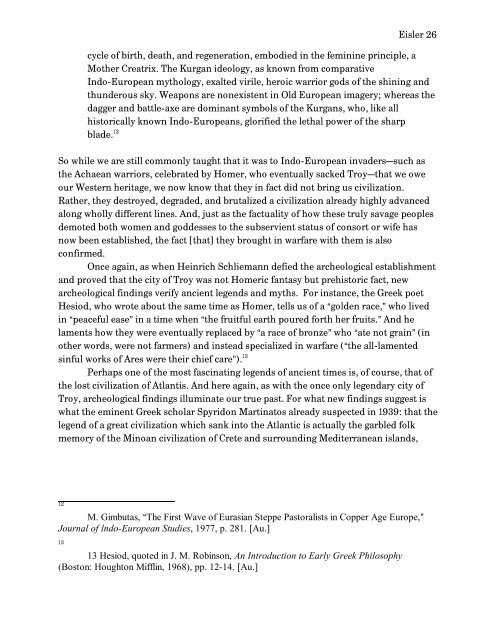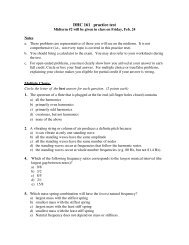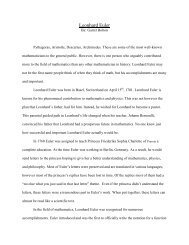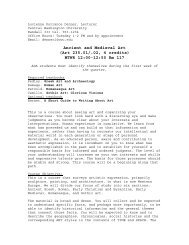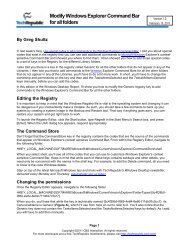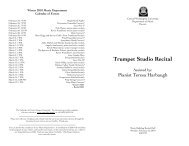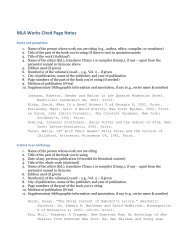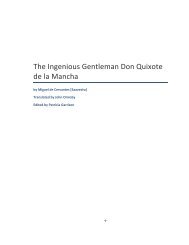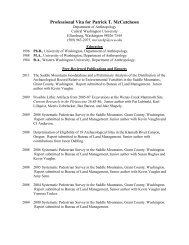THE COURAGE OF TURTLES - Central Washington University
THE COURAGE OF TURTLES - Central Washington University
THE COURAGE OF TURTLES - Central Washington University
You also want an ePaper? Increase the reach of your titles
YUMPU automatically turns print PDFs into web optimized ePapers that Google loves.
Eisler 26<br />
cycle of birth, death, and regeneration, embodied in the feminine principle, a<br />
Mother Creatrix. The Kurgan ideology, as known from comparative<br />
Indo-European mythology, exalted virile, heroic warrior gods of the shining and<br />
thunderous sky. Weapons are nonexistent in Old European imagery; whereas the<br />
dagger and battle-axe are dominant symbols of the Kurgans, who, like all<br />
historically known Indo-Europeans, glorified the lethal power of the sharp<br />
blade. 12<br />
So while we are still commonly taught that it was to Indo-European invadersCsuch as<br />
the Achaean warriors, celebrated by Homer, who eventually sacked TroyCthat we owe<br />
our Western heritage, we now know that they in fact did not bring us civilization.<br />
Rather, they destroyed, degraded, and brutalized a civilization already highly advanced<br />
along wholly different lines. And, just as the factuality of how these truly savage peoples<br />
demoted both women and goddesses to the subservient status of consort or wife has<br />
now been established, the fact [that] they brought in warfare with them is also<br />
confirmed.<br />
Once again, as when Heinrich Schliemann defied the archeological establishment<br />
and proved that the city of Troy was not Homeric fantasy but prehistoric fact, new<br />
archeological findings verify ancient legends and myths. For instance, the Greek poet<br />
Hesiod, who wrote about the same time as Homer, tells us of a Agolden race,@ who lived<br />
in Apeaceful ease@ in a time when Athe fruitful earth poured forth her fruits.@ And he<br />
laments how they were eventually replaced by Aa race of bronze@ who Aate not grain@ (in<br />
other words, were not farmers) and instead specialized in warfare (Athe all-lamented<br />
13<br />
sinful works of Ares were their chief care@).<br />
Perhaps one of the most fascinating legends of ancient times is, of course, that of<br />
the lost civilization of Atlantis. And here again, as with the once only legendary city of<br />
Troy, archeological findings illuminate our true past. For what new findings suggest is<br />
what the eminent Greek scholar Spyridon Martinatos already suspected in 1939: that the<br />
legend of a great civilization which sank into the Atlantic is actually the garbled folk<br />
memory of the Minoan civilization of Crete and surrounding Mediterranean islands,<br />
12<br />
M. Gimbutas, AThe First Wave of Eurasian Steppe Pastoralists in Copper Age Europe,@<br />
Journal of lndo-European Studies, 1977, p. 281. [Au.]<br />
13<br />
13 Hesiod, quoted in J. M. Robinson, An Introduction to Early Greek Philosophy<br />
(Boston: Houghton Mifflin, 1968), pp. 12-14. [Au.]


